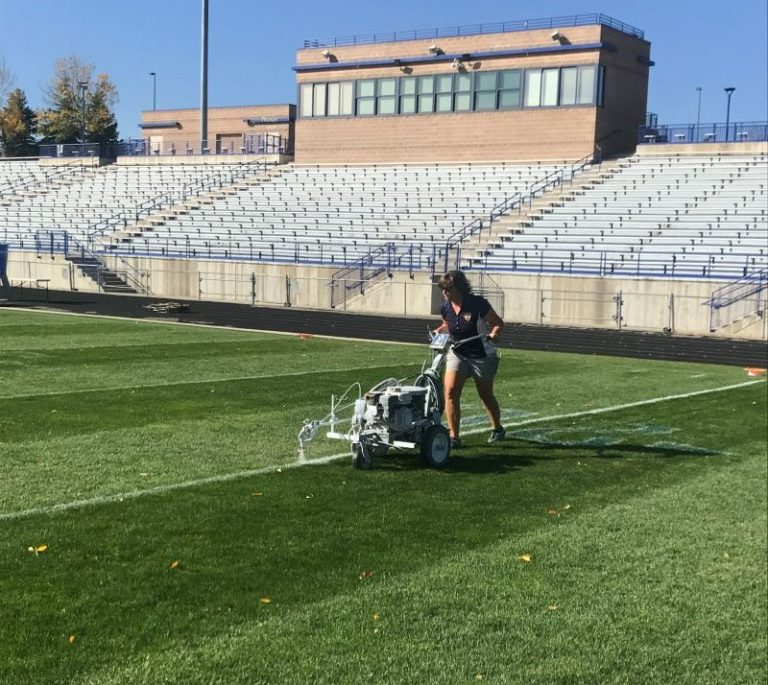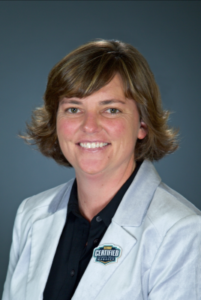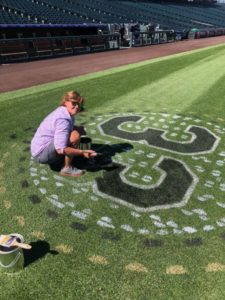In this edition of the SportsField Management Interview, we meet Sun Roesslein, CSFM, sports stadium manager at the North Area Athletic Complex (NAAC), Jeffco Schools, Golden, Colo. Roesslein is responsible for overseeing and maintaining the football stadium and soccer stadium that make up the NAAC, which is the home field for six of the high schools in the Jefferson County School District. Roesslein got her start in the turfgrass management industry working on the grounds crew for the Lexington Legends Minor League baseball team in 2001; and, after moving to Denver, she worked briefly for the City of Thornton before taking her current position with Jeffco Schools Athletics. In 2014, the NAAC soccer field was awarded STMA’s Soccer Field of the Year for the Schools and Parks category. The following year, the NAAC football field was selected as STMA’s 2015 Football Field of the Year in the same category. Roesslein received her B.S. in 2000 and M.S. in 2002 from Eastern Kentucky University in Sports Administration. She is a past president of the Rocky Mountain Regional Turfgrass Association; served on the CSTMA board of directors; and has served on STMA’s Ethics committee, Website/ Technology committee, Membership committee and is currently chair of the Certification committee, as well as secretary/treasurer of the STMA Board. In July of 2016, she earned her CSFM designation.
SportsField Management (SFM): Please tell us about your background, what attracted you to a career in the turfgrass industry, and your overall career path.
Roesslein: I really found the turfgrass industry by complete luck. I was getting my master’s degree in Sports Administration, thinking I wanted to be a college softball coach, when I fell into a summer job on the grounds crew with the Lexington Legends. I was hooked pretty quickly; and while I did finish my master’s, I decided to change my career path to the sports field management world. I worked two summers with the Legends, did some work with a sports field renovation company, and then it was time to move back out west. I needed more sunshine! After arriving in Denver, I worked for almost a year with the City of Thornton before I saw my current job posting in the newspaper. (Yes, the newspaper!) Here I am, about 16.5 years later, and still so happy to have made that decision to follow my passion. I love working outside, the consistent creativity and problem solving required, the results when a plan comes together, and, naturally, I love the smell of fresh cut grass.
SFM: Please tell us about your current role, and your typical day (if there is such a thing).
Roesslein: I always laugh at the typical day question – you are right, there really is no such thing for us. There are two stadium managers here – myself and Christi Clay, CSFM. We wear so many hats at our stadium: turfgrass managers, stadium managers and event managers. We have a football stadium and a soccer stadium that are side-by-side (both natural grass surfaces). Our stadium is the home field for six high schools in our district, and we host all their home varsity games for football, boys and girls soccer, and boys and girls lacrosse. Total for the year, we host about 30 football games, 110 soccer games and 30 lacrosse games. We are responsible for all aspects of turfgrass management for our 14 acres — mowing, cultivation, nutrition, irrigation, etc. We are also the ones who change building lightbulbs, pick up trash, clean everything from the bathrooms to the press box windows, blow off sidewalks and bleachers, layout and paint the fields according to NFHS specifications, and set up goals along with the appropriate field equipment. Then we shower and get ready to manage the actual events – schedule our game worker staff (about 16 for football and three for soccer), and train new game workers on everything from the cash registers and credit card machines to running the clock/scoreboard for all of our different sports. We have to know things like how to troubleshoot the play clocks and make slides for the video board; we help athletic trainers if they need assistance; monitor the weather/lightning; jump in to help sell tickets; even help pour hot chocolate at halftime if needed. I’m sure I’ve left out a lot, but it is safe to say that if something is happening at the NAAC, we have been involved in preparing for the event in every aspect.
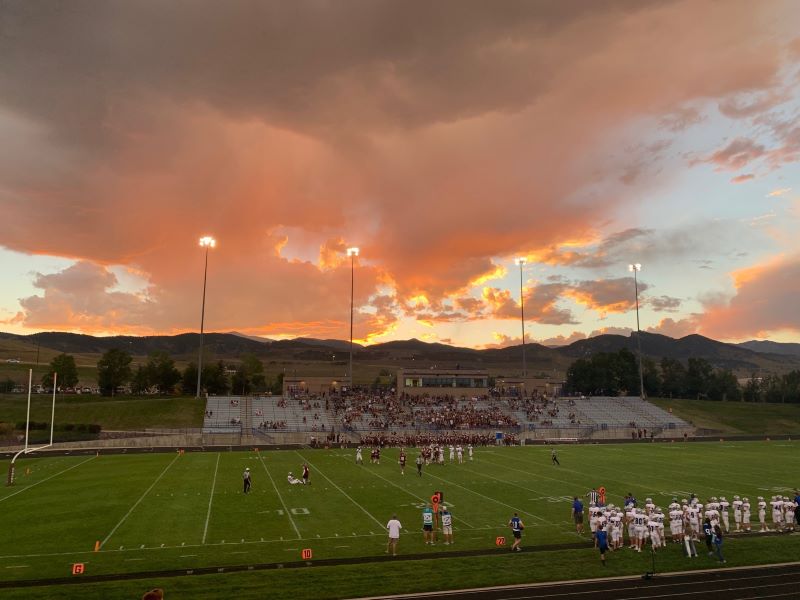
SFM: What has the last year and a half been like for you with regard to getting through COVID and all the related challenges?
Roesslein: COVID changed our game schedules and sports season around last year. We had a shortened football season; and boys soccer, which is usually played in the fall, was pushed to the early spring. Our spring sports (girls soccer, and boys and girls lacrosse) were pushed to late spring and wrapped up at the end of June. In a normal year, our seasons are finished by the end of May. So, we lost about a month of repair, recovery and project time prior to kicking off this fall. Aside from the sports schedule changing, we had great support to continue doing our jobs maintaining the fields and facility.
SFM: Outside of COVID-related challenges, what are the biggest challenges that you face on a regular basis, and how do you approach those?
Roesslein: Weather is, of course, a constant challenge. The National Wind Technology Research center is just two miles north of us, for good reason. I’ve actually had a game postponed due to high winds! It was a beautiful day, clear blue skies but nearly impossible to play soccer in 80-plus-mph winds. We also use reclaimed water and share a pond and pump house with the City of Arvada. Their facility is downhill from ours, so they have way more water pressure than we do. Between the wind and lack of irrigation pressure, you can imagine the challenges with that. There really isn’t much we can do to fight the wind, but we use wetting agents and have a couple irrigation head bases built that connect to a hose for spot watering. We’ve planted trees and shrubs as a bit of a natural wind break. Another big challenge is that we do not have an equipment budget, and ticket sales for our games go back into the school district’s general fund. So, if we need to replace or purchase any equipment, it is purely funded from any outside rentals we have hosted.
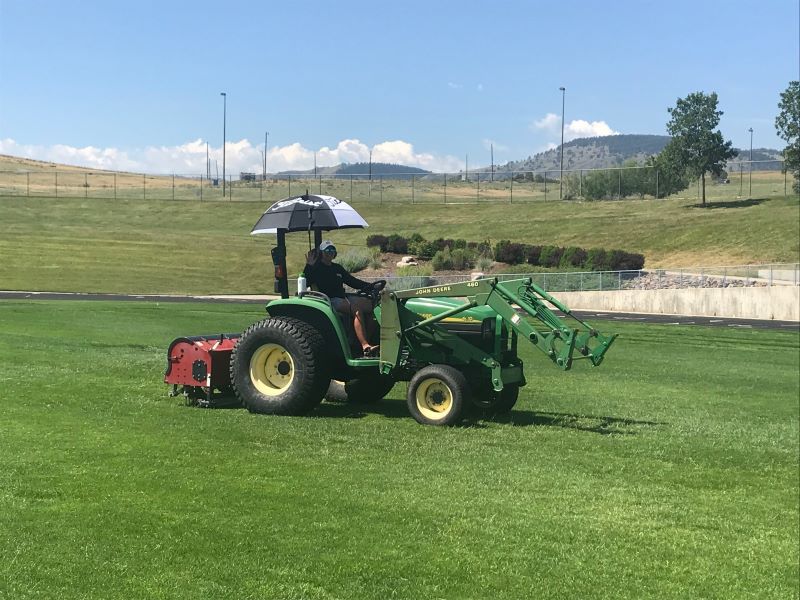
SFM: Who were your mentors in the industry, or who has impacted your career the most?
Roesslein: I’ve been extremely fortunate to have many mentors over the years, from some who have taught me aspects of the technical side of turfgrass management to some who have encouraged me to step out of my comfort zone and keep growing. Some instances have been as simple as a sidewalk conversation walking from the classes back to the hotel at an STMA Conference, while some have been more hands on. I think that everyone has something to teach others if you are willing to listen and learn. I just listened to a great podcast called Game Changers with Molly Fletcher, and her guest was Carla Harris. Their conversation about why you also need a “sponsor,” someone who advocates for you when you aren’t in the room. Of course, I would not be who or where I am today without my parents.
SFM: What would you say are the biggest accomplishments of your career and/or what are you most proud to have achieved?
Roesslein: There have been several incredible moments over the years — being elected to serve on the STMA Board of Directors, being chosen for Field of the Year, getting to be a part of the Women’s Turfgrass Team at the 2021 US Women’s Open golf championship, and having the opportunity to work two different MLB All-Star games. The things I’m most proud of are more behind the scenes – connecting people with resources to help further their goals; connections I’ve built over the years with colleagues, coaches, administrators and game workers; getting a phone call to help with a project or an issue; supporting friends in the industry; and hearing an athlete say, “Wow, that’s real grass?” when they come to our stadium for the first time.
SFM: You and I corresponded earlier this year regarding Devon Carroll’s article/research regarding women in the turfgrass industry. How has the industry changed for women over the years? What changes still need to take place? And what needs to happen to get more women interested in careers in this industry?
Roesslein: First, I’m thankful to Devon for starting this research. I think it shines a light on the kind of positive impact women can have on this industry. I think more visibility has led to a slow increase in the percentage of women in the industry, and hopefully that will continue! Representation for everyone will help open the door to more interest in sports field management careers — it’s a really cool job. I often say that I have the best office. However, generally, people still really don’t understand what it is we do. Communicating to the public more about what it takes to produce a great sports field, and telling our stories to new audiences, will help too. Working on the golf course maintenance crew at the U.S. Women’s Open was a wonderful opportunity to open some minds just by doing the work together, side by side. The full-time crew was all guys, many of whom had never worked with a female before. Volunteers were paired with a full-time crewmember on all aspects of course maintenance during the week. Initially we were treated very gently; for example, jumping in and out of the back of utility vehicles to get to our assignments was almost like we were breaking the rules. Each volunteer was willing to do whatever needed to happen in order to get the work done and produce a golf course worthy of hosting the Women’s Open championship. Once we were all moving toward the same goal, with each person contributing, it made the team successful regardless of gender.
SFM: You are a longtime member of STMA; you have served on several STMA committees; and you currently serve on the STMA Board of Directors. How has your career benefitted from being involved with STMA? And what is your advice to other sports field managers regarding the value of being involved and giving back to the industry though service?
Roesslein: I have been an STMA member since 2002. Membership in the association provides so many opportunities for growth, both personal and professional! Involvement in committees and board service has really given me the chance to meet and connect with other members on an entirely new level. Working together to strengthen the association, bring new ideas forward and hopefully improve the future of our industry is incredibly rewarding. Volunteering is something that always gives you more in return than you can ever give out. I’ve made lasting friendships, shared countless laughs, been challenged in ways I wouldn’t have in my daily responsibilities, and learned more than I ever would have without getting involved in industry service. If you are at all considering getting involved, go for it! As my friend, Kelly Lynch, says, “Get in. It will be fun. I promise!”
SFM: You also achieved your CSFM certification. What does that mean to you, and what advice do you have for other industry professionals with regard to the value of certification.
Roesslein: For me, attaining the CSFM designation was purely a personal goal. It didn’t change anything for me at work as far as a raise or change in title. I do not have a turfgrass management degree, so I wanted to become certified – really as confirmation that I’m doing the right things in the right ways. I also think, more and more, having a professional certification can only benefit your career. Absolutely it is a resume builder, but certification will also help gain trust within your organization. A certified person in any industry has proven their knowledge and skills. Our industry is so often misunderstood, I believe certification will help elevate the professionalism of sports field managers, as well as the perception of our industry. If you are on the fence about getting your CSFM, again I would say go for it! There are materials available to help you study, and many resources to help you succeed. One of the best things about our industry is that you can probably call any CSFM out there, and they would be willing to help you, too. I’m certainly happy to help!
SFM: How do you think the profession and industry will change in the next 10 years, and/or what would you most like to see in terms of industry advancement in the future?
Roesslein: There will most certainly be many technical advances that increase efficiency with all our resources – labor, materials, and water come to the top of my mind. My hope is that the expertise of our members is more widely recognized and valued in the next 10 years and beyond. Sports field managers produce incredible fields for all levels of play, and I hope that our next-door neighbors all the way up to the owner’s suite occupants understand the passion, dedication, knowledge and expertise our members have.


